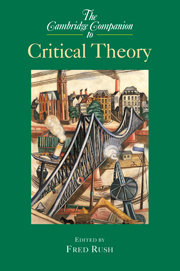Book contents
- Frontmatter
- Introduction
- 1 Conceptual foundations of early Critical Theory
- 2 Benjamin, Adorno, and the decline of the aura
- 3 The dialectic of enlightenment
- 4 The marriage of Marx and Freud
- 5 Dialectics and the revolutionary impulse
- 6 “The dead speaking of stones and stars”
- 7 Critique, state, and economy
- 8 The transcendental turn
- 9 The politics of Critical Theory
- 10 Critical Theory and the analysis of contemporary mass society
- 11 Critical Theory and poststructuralism
- 12 The very idea of a critical social science
- 13 A social pathology of reason
- Select bibliography
- Index
7 - Critique, state, and economy
Published online by Cambridge University Press: 28 May 2006
- Frontmatter
- Introduction
- 1 Conceptual foundations of early Critical Theory
- 2 Benjamin, Adorno, and the decline of the aura
- 3 The dialectic of enlightenment
- 4 The marriage of Marx and Freud
- 5 Dialectics and the revolutionary impulse
- 6 “The dead speaking of stones and stars”
- 7 Critique, state, and economy
- 8 The transcendental turn
- 9 The politics of Critical Theory
- 10 Critical Theory and the analysis of contemporary mass society
- 11 Critical Theory and poststructuralism
- 12 The very idea of a critical social science
- 13 A social pathology of reason
- Select bibliography
- Index
Summary
The theorists who conceptualized Critical Theory's general framework set themselves a double task: they sought to critically illuminate the great historical changes of the twentieth century while reflexively grounding the possibility of their critique with reference to its historical context. Most attempts to contextualize Critical Theory have done so in terms of contemporary historical developments, such as the failure of revolution in the West after World War One and the Russian Revolution, the development of Stalinism, the rise of Fascism and Nazism, and the growing importance of mass mediated forms of consumption, culture, and politics. Too often, however, such attempts do not consider that Critical Theory sought to make sense of such developments with reference to a superordinate historical context - an epochal transformation of capitalism in the first part of the twentieth century. In grappling with this transformation, the Frankfurt School theorists formulated sophisticated and interrelated critiques of instrumental reason, the domination of nature, political domination, culture, and ideology. Yet they also encountered fundamental conceptual difficulties. These difficulties were related to a theoretical turn taken in the late 1930s, in which the newer configuration of capitalism came to be conceived as a society that, while remaining antagonistic, had become completely administered and one-dimensional.
- Type
- Chapter
- Information
- The Cambridge Companion to Critical Theory , pp. 165 - 193Publisher: Cambridge University PressPrint publication year: 2004
- 6
- Cited by



